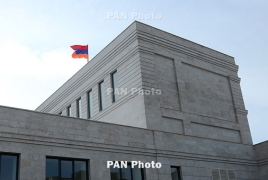
Armenia's Ministry of Foreign Affairs (MFA) has stated that it lacks the authority to directly intervene in or oversee the visa issuance processes of foreign embassies operating within the country.
According to the Vienna Convention on Consular Relations, embassies adhere to their respective national legislations. This clarification comes in response to public concerns over difficulties in securing visa appointments and allegations of appointment slots being sold.
The MFA acknowledges receiving complaints from citizens and travel agencies regarding the unavailability of appointment dates at embassies and visa centers, reports of "paid appointment slots," and unexplained visa denials, particularly from the Greek embassy. While the ministry cannot directly influence embassy operations, it raises these issues during discussions with counterparts at various levels, emphasizing the challenges in booking appointments due to increased demand.
Foreign ministry representatives have indicated that the primary reason for the difficulty in securing appointments is the surge in public interest in traveling to European countries, which exceeds the daily processing capacities of the embassies. This heightened demand is attributed to factors such as the availability of new European destinations and more affordable flight options.
In July 2024, the European Union (EU) Council approved the initiation of a visa liberalization dialogue with Armenia. Currently, efforts are underway to develop a Visa Liberalization Action Plan, which will establish clear benchmarks. Once these criteria are met, Armenian citizens will be able to travel to the EU without a visa.
Additionally, the MFA noted that Foreign Minister Ararat Mirzoyan emphasized the importance of visa-related issues during a meeting with EU ambassadors from Eastern Europe and Central Asia on May 20. The matter was also discussed in a recent meeting with French Foreign Minister Jean-Noël Barrot.
Most embassies have transitioned to using visa centers for processing applications, adding an extra fee of 15,000–20,000 AMD to the standard €35 consular fee. Despite this, the situation has not improved and has become more complicated.

